World Water Forum 8: Huge potential for nature based solutions to reduce water risks
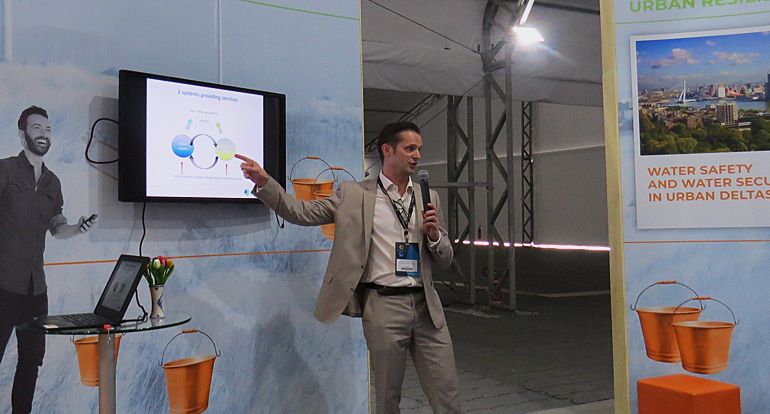
‘What makes it so difficult to bring WASH and ecosystems together’, was the rhetorical question posed by Frank van Weert of Wetlands International, presenting the Watershed programme in the Netherlands Pavilion during the 8th World Water Forum in Brasilia, Brasil.
Van Weert already knew the answer. ‘The experts on WASH have a different education than the experts on integrated water resource management. And in many countries both disciplines resort under different ministries and local authorities.’
‘It is time to harmonize WASH- and IWRM-projects and combine the delivery of WASH services with a sustainable use of water resources’, advocated the senior technical officer of Wetlands International.
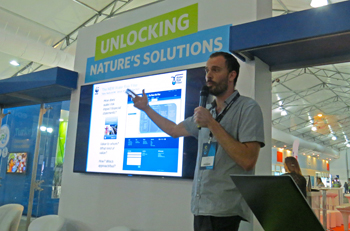 All five days of the forum presentations were given in the special pavilion on nature based solutions for water management .
All five days of the forum presentations were given in the special pavilion on nature based solutions for water management .
Special pavilion
At the World Water Forum, Wetlands International shared a special pavilion on nature based solutions (NBS), together with nature conservation organisations as World Wildlife Fund (WWF) and the International Union for Conservation of Nature (IUCN).
The joint pavilion marked the big potential of nature based solutions to optimize engineered water infrastructure by creating ecological healthy watersheds, floodplains and wetlands.
Nature based solutions was also one of the central themes of the Netherlands Pavilion and UN Water organised at the Forum the global celebration of the 25th World Water Day with the theme: Nature for water.
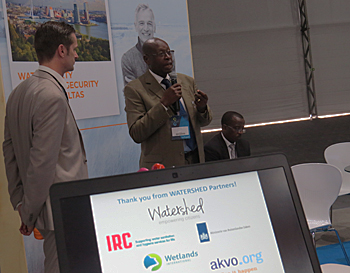 Kyebambe Henry Kimera shares the first experiences in Uganda
Kyebambe Henry Kimera shares the first experiences in Uganda
Restore sponge function of soils
‘Drought can make the sponge function of the soil to disappear. A hard soil surface makes rain water to run off quickly and there is no replenishment of the aquifers.
As a result wetlands dry out and there is no fresh water available anymore’, Van Weert explained during his presentation of the Watershed programme in the Netherlands Pavilion.
Restoring the sponge function of soils to make fresh water available again, is an important element of the combined WASH and IWRM projects within Watershed.
Watershed is a five year strategic partnership between Dutch non-profit organisations IRC, Simavi, Wetlands International and Akvo and the Dutch Ministry of Foreign Affairs in Kenya, Uganda, Mali, Ghana, Bangladesh and India.
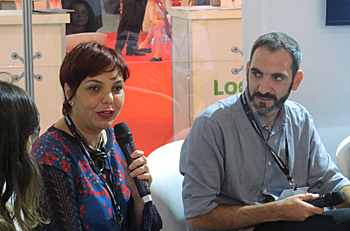 Corredor Azul programme managers Rafaela Nicola (left) of Wetlands International Brazil and Gaston Fulquet of Wetlands International Argentina.
Corredor Azul programme managers Rafaela Nicola (left) of Wetlands International Brazil and Gaston Fulquet of Wetlands International Argentina.
Launch of Corridor Azul programme
Highlight for Wetlands International at the Forum was the launch of its ten years Corredor Azul (Blue Corridor) programme, to safeguard the 3,400 km long Paraná-Paraguay wetlands system and fluvial corridor from its source in the Brazilian Pantanal, through Bolivia and Paraguay to its end point in Argentina’s Paraná Delta.
The Paraná-Paraguay wetlands system is one of the world’s last remaining examples of a large, free-flowing river system.
A major aim of the Corredor Azul programme is to safeguard and enhance three large iconic wetlands – the Pantanal, the Iberá Marshes and the Paraná Delta. In the end the entire river corridor is to become a free-flowing, dynamic wetland system.
Wetlands International's two programme managers, Gaston Fulquet and Rafaela Nicola, presented Corredor Azul at the Nature based solutions pavilion where it was officially launched on 21 March.
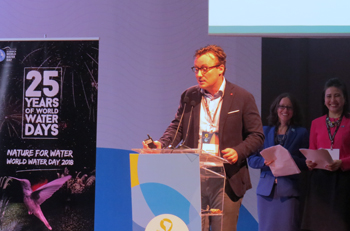 Professor Stefan Uhlenbrook comments the UN World Water development report 2018 on the celebation of World Water Day.
Professor Stefan Uhlenbrook comments the UN World Water development report 2018 on the celebation of World Water Day.
Big potential for risk reduction
On 22 March the 25th World Water Day was celebrated at the Forum and commemorated this year’s theme: Nature for water. One of the speakers at the celebration was professor Stefan Uhlenbrook of the UN World Water Assessment Programme. Uhlenbrook supervises the publications of the annual World Water development report that addresses the World Water Day’s theme.
‘Green infrastructure is no panacea’, Uhlenbrook said presenting the WWDR2018 report on nature based solutiuons. ‘The report is not to promote green versus grey solutions, but illustrates the pressing need to achieve a better balance between the two’.
The report concludes that nature based solutions offer a vital means to move beyond business-as-usual in today’s water management. However, the necessity and opportunities for increased deployment of NBS remain underappreciated.
According to the report green-infrastructure investments are less than 5 percent of the total investments in water-related infrastructure.
Nature-based solutions - such as planting trees to replenish forests, reconnecting rivers to floodplains, and restoring wetlands - is a sustainable and cost-effective way to help rebalance the water cycle, mitigate the effects of climate change and improve human health and livelihoods, this year’s WWDR-report states.
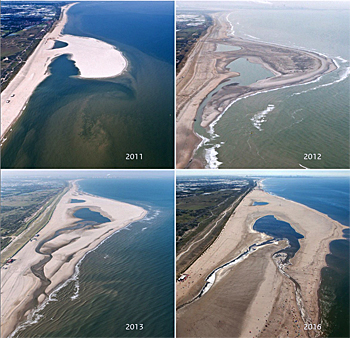 Natural elements as the tide, current and wind are used to spread the sand along the Dutch coast. This alternative type of beach nourishment is called the Sand Motor and it aims to strengthen the coastal dunes and decrease flood risks.
Natural elements as the tide, current and wind are used to spread the sand along the Dutch coast. This alternative type of beach nourishment is called the Sand Motor and it aims to strengthen the coastal dunes and decrease flood risks.
Building with nature
On the occasion of the celebration of World Water Day in Brasil, the Dutch consortium Building with Nature – Ecoshape, released a position paper that calls for joint worldwide upscaling of nature based solutions.
For ten years the Ecoshape consortium of engineering firms, knowledge institutes, dredging companies, NGO’s and government agencies, works on pilots to develop, test and share knowledge about nature based solutions.
Two successful and promising pilots are the Sand Motor, along the Dutch coast, and the natural mangrove restoration along the coast of Northern Java, Indonesia.
In order to be able to scale up these successful pilots, it is necessary to educate the new generation of engineers, designers, ecologists, policy makers, politicians and managers in the principles of nature based solutions, the position paper suggests.
Please follow this link to download the report: 2018 UN World Water Development Report: Nature-based Solutions. Ore read the Ecoshape position paper Building with Nature – the answer to water related challenges is in nature.
Read also on this website
● World Water Forum 8: A look back on a Forum under pressure to achieve SDG6 by 2030, 29 March 2018
● World Water Forum 8: Revitalised IWRM-concept can boost action on SDG6 for water, 27 March 2018
● World Water Forum 8: World Water Atlas gathers compelling stories on urgent water issues, 26 March 2018
● World Water Forum 8: Launch of Dutch Blue Deal programme in support of SDG6 on water, 23 March 2018
● World Water Forum 8: Water Youth Network strengthens ties with research institute Deltares, 21 March 2018
● World Water Forum 8: A call on the world to fully value water, not just prizing, 21 March 2018
● World Water Forum 8: Thirsty cities need to double investments in water infrastructure, 20 March 2018
● Special page on Dutch participation at World Water Forum 8
More information
World Water Forum 8
www.worldwaterforum8.org
UN Water
www.unwater.org
Wetlands International
Ede, the Netherlands
+31 318 660 910
www.wetlands.org
Building with Nature – Ecoshape
Dordrecht, the Netherlands
+31 78 611 1099
www.ecoshape.org



